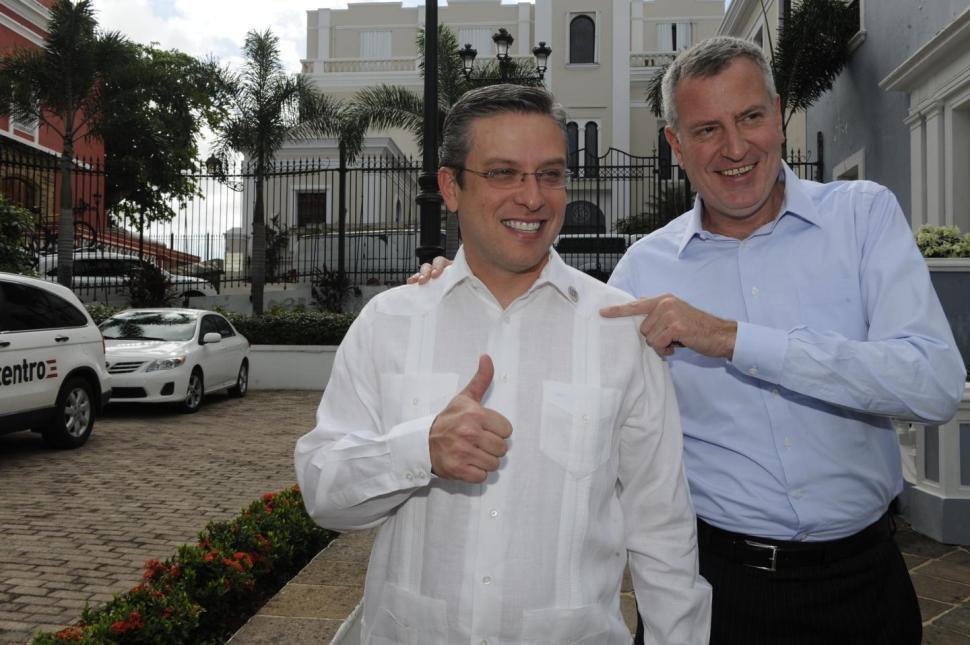
While Congress turns its back on the economic crisis in Puerto Rico, New York’s leaders are rushing to aid the island.
Gov. Cuomo and Mayor de Blasio head to San Juan on Thursday, where they will join a public rally against unequal federal payments to the island’s Medicaid and Medicare programs. Cuomo even deployed a team of state health officials that has been working for weeks with Puerto Rico’s government to secure more than $1 billion in new Medicaid money from the Obama administration.
The governor will also launch a state office in Puerto Rico to promote commerce with the island.
Our mayor and governor joining a protest directed at the feds is sure to draw much attention. That march — billed as Puerto Rico United for Health — coincides with the Somos el Futuro conference, a junket put on annually in San Juan by New York Latino politicians. That event has always been marked by perfunctory appearances from New York governors and mayors.
But given the island’s financial crisis, conference organizers are finally doing something useful. They will feature a plenary on the impending collapse of Puerto Rico’s health care system, then urge conference participants to join the health care march.
The rapid crumbling of the island’s health care system has gotten far less attention than the looming government default on its massive $72 billion debt. For more than 40 years, Congress has capped federal reimbursements to Puerto Rico for Medicare and Medicaid at levels far lower than that for the 50 states — even though islanders pay the same rates of Medicare taxes as those in the U.S. Despite that, residents are totally excluded from some programs, such as Medicare’s Supplemental Security Income or Medicaid’s nursing and long-term care.
Dr. Johnny Rullan, for example, is one of Puerto Rico’s best-known doctors. He once served as its secretary of health. Rullan’s daughter has required long-term care for severe mental disabilities for 25 years. “I’ve paid $2,000 a month all that time for her care with no reimbursement from the federal government,” Rullan said.
And that’s true whether you are a wealthy doctor or a public housing resident on Medicaid. In Puerto Rico, doctor and hospital reimbursements are so low that patients wait months for appointments to see a specialist. “Anyone who wants proper care in a public hospital has to pay for private nurses out of their own pockets,” Rullan notes.
For years, the cap meant that the federal government paid just 15% of Puerto Rico’s Medicaid costs. New York gets about 50% from the feds. And the poorest states, like Alabama and Mississippi, are reimbursed a staggering 80% of Medicaid costs. Yet, Puerto Rico, with its 3.5 million U.S. citizens, has to pay the most.
“Roughly $20 billion of the (Puerto Rican) government’s debt is a direct result of having to borrow for Medicaid costs,” said Jason Helgerson, New York State Medicaid director. Helgerson has been spearheading a team of state officials Cuomo dispatched to San Juan to help prepare a “Medicaid waiver” proposal from Puerto Rico to the Obama administration.
Under the plan, Puerto Rico could qualify for more than $1 billion to modernize its Medicaid system. And the White House could implement the proposal without approval from Congress.
Puerto Rico, it turns out, has more friends than the politicians in Washington realize.



Expositores: Oscar Vidarte (PUCP) Fernando González Vigil (Universidad del Pacífico) Inscripciones aquí. Leer más
Una retrospectiva para entender los próximos cuatro años. Leer más
En la conferencia se hará una presentación de los temas más relevantes del proceso de negociación se llevó a cabo desde el 2012, así como del acuerdo de paz firmado entre el Gobierno colombiano y la guerrilla de las FARC a finales del 2016. Se analizarán los desafíos y las... Leer más
El Observatorio de las Relaciones Peruano-Norteamericanas (ORPN) de la Universidad del Pacífico es un programa encargado de analizar y difundir información relevante sobre la situación política, económica y social de Estados Unidos y analizar, desde una perspectiva multidisciplinaria, su efecto en las relaciones bilaterales con el Perú.
© 2026 Universidad del Pacífico - Departamento Académico de Humanidades. Todos los derechos reservados.

